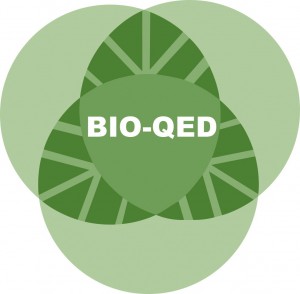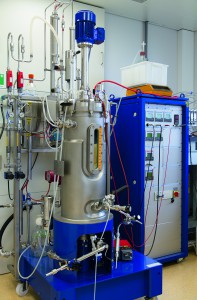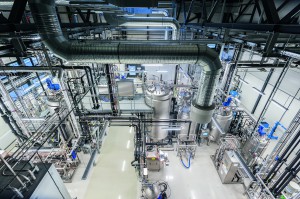Description of the BioQED (Quod Erat Demonstrandum: Large scale demonstration for the bio-based bulk chemicals BDO and IA aiming at cost reduction and improved sustainability project)

Europe is preparing for a transition from a fossil- to a bio-based economy and this European Bioeconomy offers, as described in the EC Strategy Paper and Action plan “Innovating for Sustainable Growth: A Bioeconomy for Europe”, a comprehensive answer to key societal challenges, like creating and maintaining jobs, maintaining thecompetitiveness of the European Process Industries, adaptation to climate change, reducing the dependency on non-renewable feedstocks and “more with less” strategy on renewable biomass used for food, added valuechemicals and energy.
Due to its extensive scope and complex character such a transition is expected to take at least 1 to 2 decades. The current starting position for Europe on the biotechnological production of added value chemicals fromrenewable biomass is still very good, with its leading scientific position on industrial White Biotechnology, the global top positions of the European chemical and agro-food industries and the sophisticated logisticinfrastructure, but there is a urgent need to go to commercial exploitation to prevent that Europe loses its strong position to faster acting competing economies.
In this framework, an entrepreneurial consortium was built with the joint ambition to generate hard evidence and collect all technical/economic key design parameters needed for investment decisions for the first industrialproduction plants for the bio-based building blocks 1,4 butanediol and itaconic acid, which would definitely contribute to guiding these 2 important bio-based chemical building blocks through the notorious “Innovation Valley of Death” to industrial deployment. The consortium is based on strong industrial leadership on both of theselected products, and covers the full supply chains for bio-based BDO and IA. The planned demonstrations are solidly based on preceding research results originating from the KBBE Flagship Project BioConSepT and theinternal research programs of the industrial partners.
Short overview of the objectives of the different work packages
WP1: Evaluation of 1st and 2nd generation feedstock
The challenges to overcome and the technological advances that this project intends to realise are aimed at the
identification of innovative solutions to:
• use and valorise all the by-products from 1st generation sugars available without competition with the food
supply chain as well as supply 2nd generation feedstock
• develop toxicity test and select sugars from lignocellulosic feedstock for fermentation processes of BDO and IA
to be developed in WP2s
WP2: Upstream process – fermentation development
• To develop and optimise different robust microbial fermentation processes with 1st and 2nd generation
feedstock from WP1 in 50 L scale equipment.
• To enhance time space yield and productivities for the production of the platform chemicals BDO and IA by
batch, fed-batch, (semi)continuous or novel fermentation processes at 50 L scale
• Evaluate fermentation processes towards scale-up in WP4
• To deliver broths with platform chemicals to further downstream process development (WP3).
WP3: Downstream process (separation and purification) (up to 50 l)
• To test and implement pre-selected separation techniques to recover butanediol (BDO) and itaconic acid (IA)
from fermentation broth at a scale up to 50 L.
• To apply BDO and IA recovery technique as ISPR to improve productivities and feedstock impurities inhibition
• To test and implement techniques to purify BDO and IA from the stream coming out of the separation step at a
scale up to 50 L.
• To deliver purified samples of IA and BDO for application research in WP5 (kg scale).
WP4: Scale-up: integration of fermentation and downstream processing
• To provide information for integration of fermentation and downstream sections to produce BDO and IA;
• To test engineering concepts from WP2 and WP3 via pilot-scale to industrial scale;
• To demonstrate the technical feasibility of the production of platform chemicals on pilot-scale by efficient
processes with optimized continuous fermentation and novel integrated production and separation techniques.
WP5: Application development and end of use
• To transform BDO and IA into intermediary derivatives;
• To further process intermediates into end-user / value added applications;
• To characterize properties and evaluate the performance of these applications;
• To provide feedback/guidance for the developments in other WPs;
• To produce prototypes of piloted end-user products.
WP6: Sustainability assessment
• To evaluate the technical and economic feasibility and sustainability of the developed production processes
and final products
• To evaluate the environmental impact of the developed production processes and final products
WP7: Dissemination and exploitation
• To promote BiO-QED and its results as widely and as effectively as possible to all relevant stakeholders
• To ensure widespread dissemination of the results to the stakeholders, the broad public and the scientific
community;
• To ensure proper and effective handling of Intellectual Property
• To implement a toolbox-supported IP Strategy in order to maximizethe exploitation of project results for
individual and combined partners inside and outside the consortium
• Development of a Technology Implementation Plan (TIP);
• To prepare documentation of new products and processes for standardization
WP8: Project coordination and management
• To ensure efficient coordination of the project
• To ensure efficient management of common consortium activities
• To ensure efficient administrative, financial and contractual management
(All images © Fraunhofer IGB and © Fraunhofer CBP)
 Europe is preparing for a transition from a fossil- to a bio-based economy and this European Bioeconomy offers, as described in the EC Strategy Paper and Action plan “Innovating for Sustainable Growth: A Bioeconomy for Europe”, a comprehensive answer to key societal challenges, like creating and maintaining jobs, maintaining thecompetitiveness of the European Process Industries, adaptation to climate change, reducing the dependency on non-renewable feedstocks and “more with less” strategy on renewable biomass used for food, added valuechemicals and energy.
Europe is preparing for a transition from a fossil- to a bio-based economy and this European Bioeconomy offers, as described in the EC Strategy Paper and Action plan “Innovating for Sustainable Growth: A Bioeconomy for Europe”, a comprehensive answer to key societal challenges, like creating and maintaining jobs, maintaining thecompetitiveness of the European Process Industries, adaptation to climate change, reducing the dependency on non-renewable feedstocks and “more with less” strategy on renewable biomass used for food, added valuechemicals and energy.

